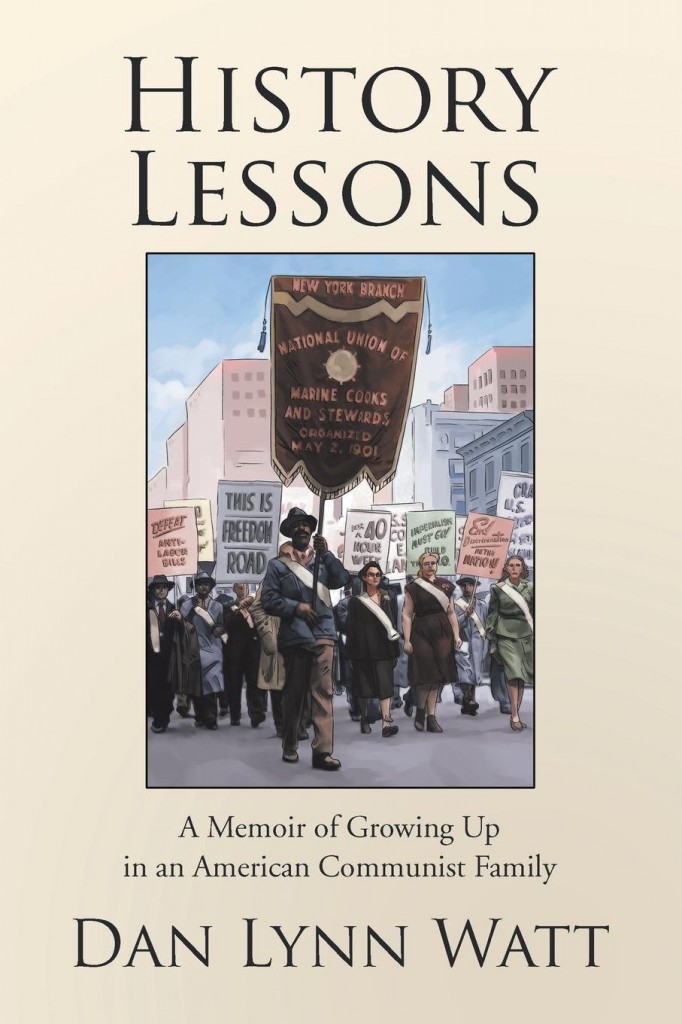Book Review: A Memoir of Growing Up in an American Communist Family
History Lessons: A Memoir of Growing Up in an American Communist Family, by Dan Lynn Watt. Bloomington, Indiana: Xlibris, 2017, 351 pp.
History Lessons is the memoir of a ‘red diaper” baby, the child of devoted and active members of the Communist Party of the United States (CPUSA), from the post-World War II Red Scare to the Civil Rights movement in the early 1960s. Dan Watt’s parents and grandparents, as well as his aunts and uncles, were prototypes of the core membership of the Party in its heyday. First and second-generation immigrants from Eastern Europe, as Communists they combined a cosmopolitan and internationalist attention to world events with a support for the struggle for social justice and workers’ rights and against the racial discrimination so deeply rooted in US culture and politics. Their faith that a better world was on the horizon was reinforced by an idealized view of the Soviet Union as a “workers’ paradise.”
In History Lessons Dan Watt provides a compendium of anecdotes detailing family stories along with his recollections of the experiences of a Communist family from the hopes and dreams of the Popular Front period and war years, to the repression, heartache and disillusionment of the 1940s and 1950s. Watt was born in 1940 and grew up in what he describes as a loving, supportive and militant environment steadfastly committed to helping build a socialist future. As a young child Dan, along with his activist parents, marched in May Day parades, picketed to protest police brutality and discrimination against African Americans in suburban Long Island, and carried signs in support both of Henry Wallace and Smith Act defendants, as well as against Taft-Hartley. Whether it be during demonstrations, while attending summer Communist youth camps or simply at social events at home or on family vacations, he recounts that songs of struggle and hope (many of which were popularized by Paul Robeson, Peter Seeger, and the Weavers) played an import role as performances of solidarity, ways to express a message and the foundations for building a community.
However, outside of this tightknit radical community growing up as a “communist kid” could be a frightening experience. The most compelling sections of the book are the ones in which Dan Watt describes the heavy toll the post-World War II Red Scare took on Communist families, including children. Specifically, he conveys the climate of fear and sense of isolation that came from having to conceal from neighbors, schoolmates and teachers his family’s politics and his own Communist youth activities.
The person that looms large over the story is Dan’s father George. As many readers of The Volunteer know, George Watt was a committed Communist, an unwavering antifascist and, by all accounts, as his longtime friend Saul Wellman once told me, “a genuinely good guy.” George Watt’s wartime experiences were the stuff of legend: at the age of twenty-four while fighting with the International Brigades in Spain, after barely escaping the Fascist onslaught during the Retreats by swimming across the freezing Ebro River, he was appointed political commissar of the Lincoln Battalion. During World War II, once again in the thick of the fight, George miraculously bailed out of a burning B-17 over Belgium and then, with the support of networks set up by the Resistance, traveled south crossing the Pyrenees once again back into Spain from where he was spirited back to England. After the war George resumed his organizing activities for the CPUSA. In the repressive environment of the post-war Red Scare, George was among the small cadre of members selected to go underground to provide continuity and leadership should the party be declared illegal.
It is impossible not to read History Lessons as a son’s effort to make peace with his father’s towering presence in his life. With this memoir, Dan Watt comes out of the shadows to which he (and many other “red diaper babies” like him) had been relegated throughout the course of the Cold War. In the end, History Lessons is a statement of love, appreciation and pride for having grown up and come age in such a stimulating and supportive family.
Fraser Ottanelli teaches History at the University of South Florida.













